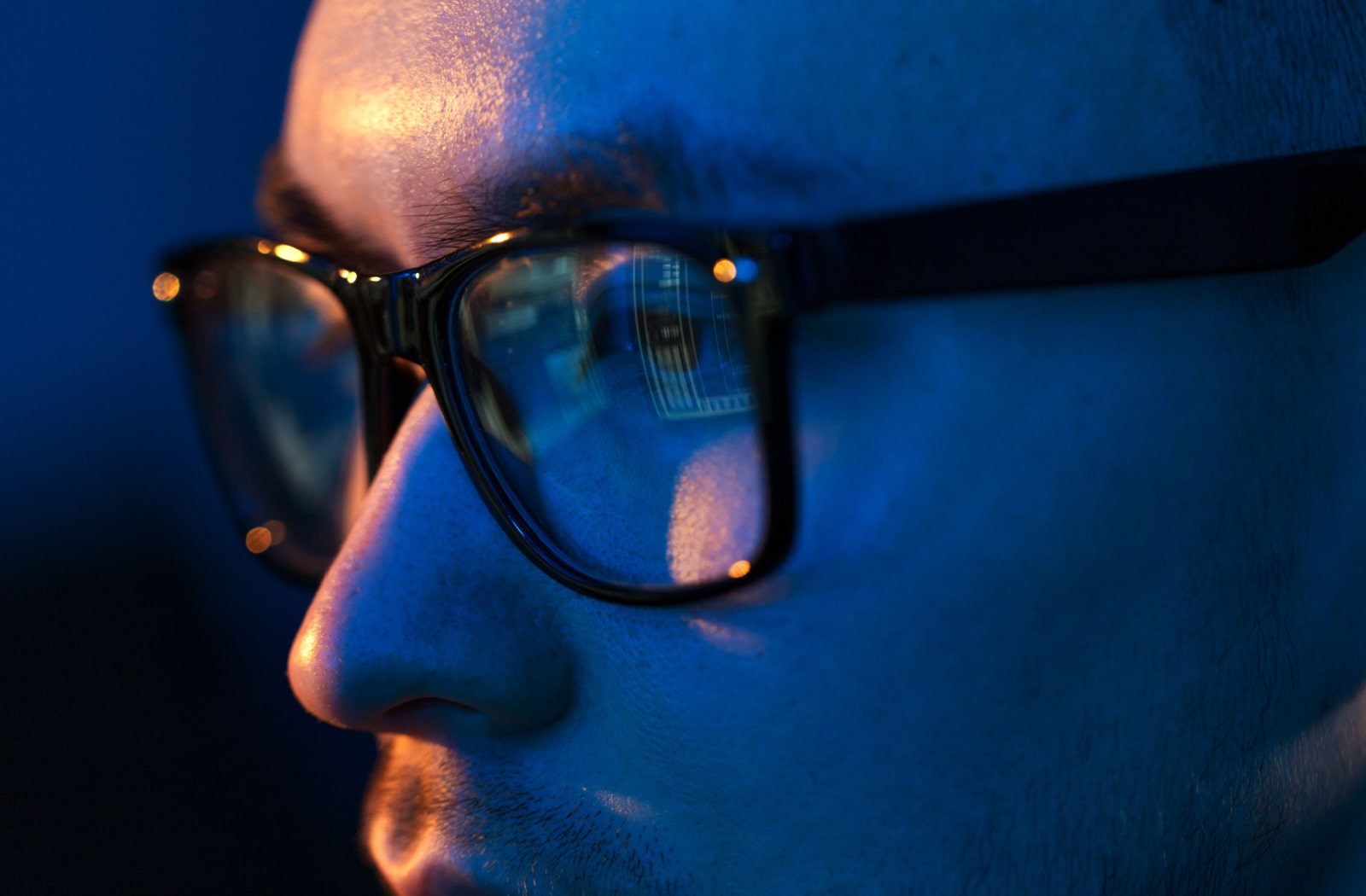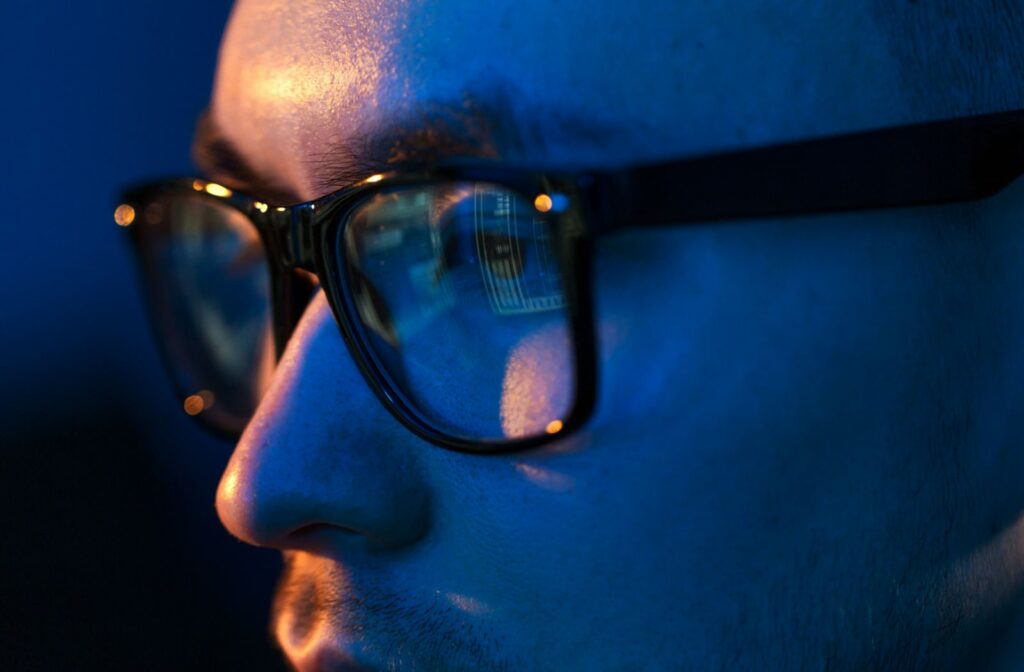There’s a lot of buzz about blue light these days and its potential effect on our eye health. Some have said excess blue light exposure can contribute to digital eye strain, but research remains inconclusive. Although there may be some connection between screen use and conditions like eye strain and dry eyes, more research is needed to examine the role that blue light plays.
However, blue light can affect us in other ways, such as disrupting our circadian rhythms—our natural sleep cycles. Blue light protection for glasses can reduce the effects of blue light with coatings or filters built into your lenses. Learning more about blue light and speaking with an optometrist can help you decide if you need blue light protection for your glasses.
What Is Blue Light?
Blue light is a type of high-energy visible (HEV) light that is emitted by electronic devices such as smartphones, tablets, and computer screens. It is also present in natural sunlight. The human eye is particularly sensitive to blue light, which can penetrate deep into the retina.
Blue light can actually be beneficial in the morning to help regulate hormone levels, leading to a better sleep-wake cycle. However, excessive blue light exposure, especially before bed, could disrupt your sleep.
Although there isn’t a direct link between blue light and conditions like macular degeneration or dry eye, long-term exposure to blue light from digital devices has been associated with potential negative effects on eye health and sleep patterns.
Using blue light filters or wearing glasses with blue light-blocking lenses may be beneficial in reducing the possible impact of blue light. Blue light and its effects can also be reduced by adjusting the settings on some electronic devices or limiting screen time before bed.
Types of Blue Light Protection
The types of blue light protection available have increased as research continues into the effects of blue light on our health.
Blue Light Blocking Glasses
Glasses designed to block blue light have lenses with a coating that can filter out the blue light our screens emit. Some lenses have blue light-blocking technology built into the lens material itself instead of a coating. Wearing blue light blocking glasses may help reduce the potential negative effects of blue light on your eyes or overall health.
Blue light-blocking lenses are readily available from many lens manufacturers. When you visit us, we can discuss your lens options and help you pick coatings that support your eye health. We may also be able to combine multiple coatings or filters on one lens, like anti-glare and blue light protection, for example.
Blue Light Screen Protectors
Some screen protectors are specially designed to reduce blue light exposure. They work by filtering out the blue light and allowing only the beneficial light to pass through. Some models even come with privacy filters that can prevent your screen from being viewed by others.
Night Mode Settings & Software Applications
Some devices now have the option to toggle on a night mode setting. This mode is designed to shift the colour temperature of your screen from blue light to warmer tones. By doing so, you may be able to reduce your nighttime blue light exposure. Lowering your exposure to blue light may help improve your quality of sleep.
There are also various software applications you can download to your device that can adjust your screen’s colour. These applications work similarly to the night mode setting on your device.
Blue Light Filtering Light Bulbs
Blue light filtering light bulbs can filter out blue light emissions from lights and lamps in your home. They come in various shapes, sizes, and types to help you find a bulb that fits the fixtures in your home.
What Are the Benefits of Blue Light Glasses?
It’s common to see claims of blue light-blocking glasses preventing digital eye strain from excessive computer use or dry eye syndrome. While there is still research being done on the long-term effects of blue light on our eye health, the evidence that blue light can directly cause eye strain remains inconclusive.
One thing we do know about blue light is that it can disrupt our natural circadian rhythms, which can play a role in sleep and daily mental health.
Mood Regulation
Mood disorders are often linked with disrupted circadian clock-controlled responses, such as sleep and cortisol secretion. While disrupted sleep patterns may not be a direct cause of conditions related to mood regulation, changes to your sleep cycle can exacerbate the symptoms of those conditions.
Depression & Anxiety
Depression is believed to be associated with disturbances in our circadian rhythms. Circadian rhythms, which regulate our sleep-wake cycles, are often disrupted in individuals experiencing depression. Moreover, disturbances in your circadian rhythm can exacerbate a depressive state due to altered patterns in the secretion of monoamines, such as serotonin.
Talk with Your Optometrist About Your Lens Options
Blue light glasses aren’t a cure-all or prevention for common eye-related problems like dry eye or digital eye strain. But that doesn’t mean they can’t still be beneficial to your eyes and overall well-being.
Contact us at View Pointe Vision + Style. We’re happy to make an appointment to discuss your lens options. When you’re dealing with uncomfortable symptoms of eye strain or dry eye, we can offer some insight on possible treatments and habits for managing your symptoms.


